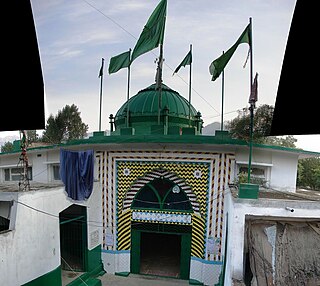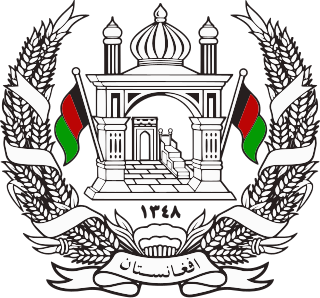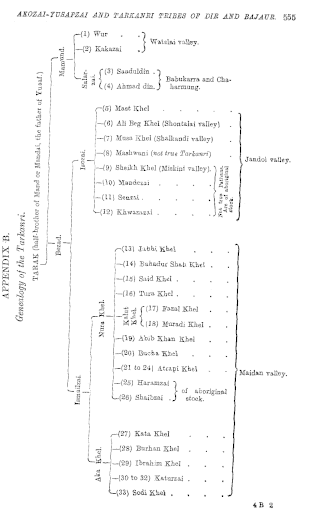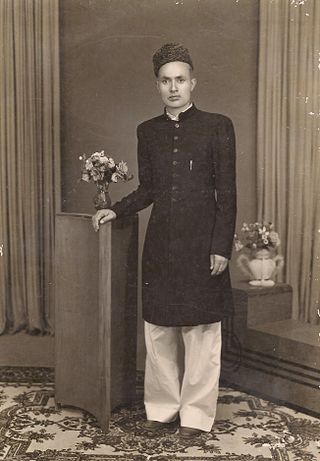
Nowshera District is a district in the Peshawar Division of the Khyber Pakhtunkhwa province of Pakistan. The capital and district headquarter is Nowshera city.
The Marwat is a Pashtun tribe, a branch of the Lohani tribe and belong to Lodi section. The Marwats were named for their ancestor Marwat Khan Lodi.
Ghulam Faruque Khan Khattak HPk, CIE, OBE was a Pakistani politician and businessman who was the founder of Ghulam Faruque Group.

Paniala Pashto: پنياله Pashto pronunciation:[panyɑla] is a small town located in the north of district D.I.Khan of Khyber-Pakhtunkhwa about 55 km away from D I Khan and approx 300 km from provincial capital Peshawar. The Link Road from main Indus Highway that connects with Paniala is of about 18 km. It is a submontane settlement and one of the oldest in Khyber Pakhtunkhwa Province in Pakistan.

Akhūnd Abdul Ghaffūr was a prominent religious saint and founder of the state of Swat. The city of Saidu Sharif, that serves as the administrative capital of Swat District, is named after him.

Sayyid Ali Tirmizi, more commonly known as Pir Baba, was a Naqvi Sayyid, and a Sufi who settled in Buner among the Yusufzai Pashtuns. He was probably born in 908 AH, in Fergana, of Sayyid descent, died in AH 991. He was a supporter of the Mughal emperor Babar, and was an opponent of Bayazid Pir Roshan.

The Barakzai dynasty ruled modern day Afghanistan from 1823 to 1978 when the monarchy ended de jure under Musahiban Mohammed Zahir Shah and de facto under his cousin Sardar Mohammed Daoud Khan. The Barakzai dynasty was established by Dost Mohammad Khan after the Durrani dynasty of Ahmad Shah Durrani was removed from power.
Zimri Tribe is also called Zimri or Mizri, is a Pashtun tribe in Balochistan and Khyber Pakhtunkhwa, Pakistan. Some Zimri live's in Afghanistan. The name Zimri or Zmarai means "fierce tiger" in the Pashto language. The history shows that one day at the place located in Musakhail city between the Sherani and Isot, the father of Zimri had a fight with tigers in the mountains. After being victorious, the father of Musakhail gave him the honour Zmarai (lion), which means "lion" in Pashto. Zimri, Mizri, the same nation named changed due to the languages of different areas.
Tangi is a Tehsil and union council of Charsadda District in the Khyber Pakhtunkhwa province of Pakistan.
Aba Khel is the subtribe of Mandanr Yusafzai Pashtun tribe in Swabi District of Khyber Pakhtunkhwa of Pakistan. They are settled in villages Zaida, Kaddi, Hund, Shah Mansur, Khunda, Ambar, Panj Pir, Beka, Aryan, Lahor and Kheshgi .and village Ragastoon swat Khyber Pakhtunkhwa.

The Kakazai, also known as Loi, Loe, or Loye Mamund, a division of the Mamund clan, are a Pashtun tribe part of the larger Tarkani tribe who are primarily settled in Bajaur Agency, Pakistan, but originally hailed from the Laghman province of Afghanistan. However, it has grown and scattered around to such an extent that it is recognized as tribe of its own.
Sheikh Muhammad Rohani(1220-1305 AD)(Pashto:شيخ محمد روحانى) also known as Shah Muhammad Rohani and Rohani Ba Ba was a Sufi cleric born around 1220 AD. The cleric, whose shrine in southern Afghanistan attracts thousands of Sufi visitors every year, is said to have migrated to current day Afghanistan in the later parts of the 13th century AD during the decline of the Abbasid Caliphate in Baghdad. He was a disciple of the renowned Sheikh Rukn-e-Alam.

Khan Roshan Khan Yousafzai was a Pashtun historian, educationalist, and writer from Pakistan known primarily for being president of the Muslim League in Swabi and for writing books on the history of the Pashtun people.
The Akakhel, pronounced Akaa Khel or Akakhail, are a Pashtun sub-tribe of the Ghilji/Ghilzais confederation. Their mother language is Pashto. In the early 20th century, the tribe was generally pastoral. The Akakhel are one of the largest Ghilji Pashtun subtribes. A reasonable majority of those who were living on the Durand Line migrated since 1900 into Khyber Pakhtunkhwa, Balochistan and Punjab provinces of Pakistan to Sikander Abad Charsadda,Peshawar,Swat(Barikot), Buner(Topdara), Abbottabad, Nowshera, Mardan, Attock, Rawalpindi, Islamabad, Gujranwala, Gojra, Faisalabad, Lahore, Multan, Hyderabad, Karachi and Quetta. The exact population number of this clan is not known; however, it is estimated to be around 2 million all around the world The population of this tribe primarily lives in Pakistan and Afghanistan. 85% live in Pakistan and about 1% or 2% live in Afghanistan and remaining 13% lives in England, Germany, United Arab Emirates, China, Malaysia, Canada and United States of America.

Ahmad Shah Durrani invaded the Indian subcontinent from the northwest eight times between 1748 and 1767. After the assassination of Nadir Shah, Ahmad Shah Durrani succeeded the throne of Afghanistan and started plundering wealth from nearby regions. His repeated incursions brought the Mughal empire to the brink of collapse and further dealt a major blow to Maratha dominions in the North at Panipat, creating a power vacuum. His objectives were met through the raids and caused political issues in India.

NA-32 Peshawar-V is a constituency for the National Assembly of Pakistan.
Ghwarband is a valley in the Shangla District of the Khyber Pakhtunkhwa province, Pakistan.

Zabardust Khan Tanoli also known by his nick-name Suba Khan Tanoli was a chieftain of the Tanoli tribe, in 18th century Mughal India. He fought at the Third Battle of Panipat and his intelligence, rifles and zamburak artillery skills contributed to the Afghan victory. He played a considerable part with Ahmed Shah Abdali to fighting against the Sikh and Hindu Jats.

Sayyid Kastir Gul (1573-1653) also known as Sheikh Al-Mashaikh Sheikh Rahmakar alias Kaka Sahib, was an Islamic jurist and Sufi saint of the 16th and 17th centuries who is still highly revered among Afghans and Pakistanis. He is the patriarch of the Kakakhel tribe.











